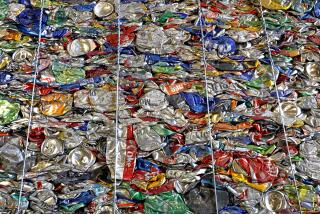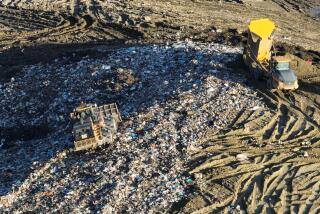Don’t let an old Mac or PC become toxic e-waste
- Share via
If there’s a new computer under your tree this morning, you might be looking at your trusty old model with a sense of nostalgia.
Environmentalists, however, see it as a toxic time bomb.
“Lead, cadmium, mercury, bromated flame retardants -- they are all used in making computers,” said Ted Smith, founder of the Silicon Valley Toxics Coalition, a group that has been fighting for 21 years against the harm that electronics products and manufacturing can cause to the environment. “They all serve a purpose, but they are also highly toxic when they get into landfills.”
This e-waste problem has been exacerbated by the incredibly swift evolution of home computers, making models only a few years old already archaic. According to a study by the National Safety Council, there will be more than 315 million obsolete computers in the U.S. alone by the end of next year.
How can you help keep your sweet old computer from becoming part of a noxious soup? By recycling or disposing of it in an environmentally responsible manner. It’s easier said than done, however. Taking either of these steps can be a bit of a pain.
Recycling is easiest if you know a charity or other organization that can make use of your old computer, not to mention your printer and other peripherals. Even if your other setup is a few years old and no longer up to the speed and memory demands of state-of-the-art home software, it may be powerful enough to handle relatively simple word-processing tasks.
This could make it a real boon to a tax-exempt 501(c)(3)organization; and to yourself as well, as you would get a tax write-off for the donation.
However, if you don’t know the name of any organization that would want your clunker and you still want to donate it, it’s going to take some research.
Perhaps the best-known online national listing of organizations that accept used computers is sponsored by Resources for Parents, Educators & Publishers. It can be found at www.microweb.com/pepsite/Recycle/recycleindex.html. Unfortunately, it lists only a handful of organizations in the Los Angeles area, and one of them -- the New Life Computer Foundation of Woodland Hills -- is not accepting computers right now because of a shortage of warehouse space.
In Orange County, the site lists Goodwill Industries facilities in Santa Ana and Fullerton that are specifically devoted to recycling computers. For more information, call (714) 543-9272 or visit www.ocgoodwill.org/computerworks.
The Share the Technology project site (sharetechnology.org) lists a few additional area organizations seeking computer donations.
The site also offers savvy recycling tips, including killing all personal files on the hard drive before handing a computer over to an organization. It also offers guidelines on finding a worthy recipient on your own.
The National Technology Recycling Project lists no groups in the Los Angeles area (the nearest is in Lakeside, near San Diego), but it does remind those visiting the site (www.ntrp.org) that cellphones, personal digital assistants (PDAs) and printer ink cartridges are also sometimes welcomed by charities for recycling.
If you can’t find a nearby organization to accept your computer, or if it is just too antiquated to be of much use to anyone, you can opt for responsible disposal.
The Silicon Valley Toxics Coalition maintains a national list of disposal companies that have signed a “pledge of true stewardship” that includes a promise to “not allow any hazardous e-waste we handle to be sent to solid-waste [nonhazardous waste] landfills.”
A listing of these companies, a handful of which are in Southern California, can be found at www.svtc.org/cleancc/recycle/pledgesigners.htm.
The city of Los Angeles Public Works Department runs four disposal centers that accept numerous types of e-waste -- see www.lacity.org/san/safe.htm for their locations. The department also sponsors several disposal “events” every month to accept harmful waste, including the electronic variety, in various parts of the county. For a schedule, see ladpw.org/epd/Hhw/ schedule.cfm.
Finally, the county maintains a listing of responsible disposal contacts in numerous cities, from Agoura Hills to Whittier. For example, the city of Monrovia has recycle bins that accept rechargeable batteries and other potential e-waste items at City Hall and the community’s libraries. For the list of cities, see
www.lacsd.org/swaste/Recy clingResources/swcntax.asp.







